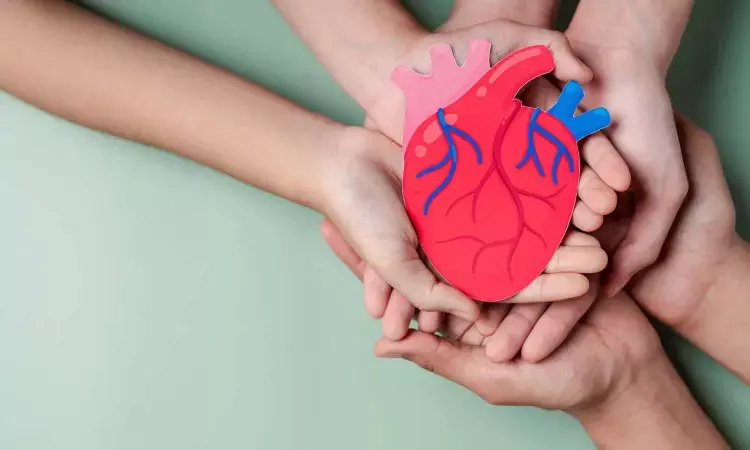- Home
- Medical news & Guidelines
- Anesthesiology
- Cardiology and CTVS
- Critical Care
- Dentistry
- Dermatology
- Diabetes and Endocrinology
- ENT
- Gastroenterology
- Medicine
- Nephrology
- Neurology
- Obstretics-Gynaecology
- Oncology
- Ophthalmology
- Orthopaedics
- Pediatrics-Neonatology
- Psychiatry
- Pulmonology
- Radiology
- Surgery
- Urology
- Laboratory Medicine
- Diet
- Nursing
- Paramedical
- Physiotherapy
- Health news
- Fact Check
- Bone Health Fact Check
- Brain Health Fact Check
- Cancer Related Fact Check
- Child Care Fact Check
- Dental and oral health fact check
- Diabetes and metabolic health fact check
- Diet and Nutrition Fact Check
- Eye and ENT Care Fact Check
- Fitness fact check
- Gut health fact check
- Heart health fact check
- Kidney health fact check
- Medical education fact check
- Men's health fact check
- Respiratory fact check
- Skin and hair care fact check
- Vaccine and Immunization fact check
- Women's health fact check
- AYUSH
- State News
- Andaman and Nicobar Islands
- Andhra Pradesh
- Arunachal Pradesh
- Assam
- Bihar
- Chandigarh
- Chattisgarh
- Dadra and Nagar Haveli
- Daman and Diu
- Delhi
- Goa
- Gujarat
- Haryana
- Himachal Pradesh
- Jammu & Kashmir
- Jharkhand
- Karnataka
- Kerala
- Ladakh
- Lakshadweep
- Madhya Pradesh
- Maharashtra
- Manipur
- Meghalaya
- Mizoram
- Nagaland
- Odisha
- Puducherry
- Punjab
- Rajasthan
- Sikkim
- Tamil Nadu
- Telangana
- Tripura
- Uttar Pradesh
- Uttrakhand
- West Bengal
- Medical Education
- Industry
High neutrophil counts causal risk factor for atherosclerotic cardiovascular disease

A recent study published in the European Heart Journal highlighted the pivotal role of inflammation on cardiovascular health by establishing a causal link between elevated neutrophil counts and increased risk across multiple cardiovascular endpoints. The findings from both observational and genetic approaches provided a crucial insight into potential possibilities of preventing and managing cardiovascular disease.
The study analyzed data from the Copenhagen General Population Study and involved 101,730 participants. Also, the UK Biobank contributed individual-level data from 365,913 participants for one-sample Mendelian randomization (MR), while summary-level data from 563,085 participants were utilized for two-sample MR analyses through the Blood Cell Consortium.
The observational analyses highlighted a critical association between high neutrophil counts and increased risks across nine cardiovascular endpoints. The UK Biobank analyses revealed that a 1-SD increase in genetically predicted neutrophil counts that was correlated with higher odds ratios for ischemic heart disease (1.15), myocardial infarction (1.22), and peripheral arterial disease (1.19). On a positive note, these associations remained consistent when analyzed separately for men and women.
Two-sample MR analyses further strengthened the causal link that found odds ratios of 1.14 for ischemic heart disease and 1.11 for myocardial infarction per 1-SD increase in genetically predicted neutrophil counts. Also, the robustness was maintained through multiple sensitivity analyses. However, no similar associations were found for other types of leukocytes that underline the specificity of the neutrophil-atherosclerotic cardiovascular disease connection.
The conclusive evidence of the study establishes high blood neutrophil counts as a causal risk factor for atherosclerotic cardiovascular disease. This breakthrough gives us an avenue for targeted interventions and therapies to modulate neutrophil counts that can the prevent and manage cardiovascular diseases. This study offers promising outcome for future strategies that can resolve the global burden of cardiovascular diseases.
Reference:
Luo, J., Thomassen, J. Q., Nordestgaard, B. G., Tybjærg-Hansen, A., & Frikke-Schmidt, R. (2023). Neutrophil counts and cardiovascular disease. European Heart Journal, 44(47), 4953–4964. https://doi.org/10.1093/eurheartj/ehad649
Neuroscience Masters graduate
Jacinthlyn Sylvia, a Neuroscience Master's graduate from Chennai has worked extensively in deciphering the neurobiology of cognition and motor control in aging. She also has spread-out exposure to Neurosurgery from her Bachelor’s. She is currently involved in active Neuro-Oncology research. She is an upcoming neuroscientist with a fiery passion for writing. Her news cover at Medical Dialogues feature recent discoveries and updates from the healthcare and biomedical research fields. She can be reached at editorial@medicaldialogues.in
Dr Kamal Kant Kohli-MBBS, DTCD- a chest specialist with more than 30 years of practice and a flair for writing clinical articles, Dr Kamal Kant Kohli joined Medical Dialogues as a Chief Editor of Medical News. Besides writing articles, as an editor, he proofreads and verifies all the medical content published on Medical Dialogues including those coming from journals, studies,medical conferences,guidelines etc. Email: drkohli@medicaldialogues.in. Contact no. 011-43720751


